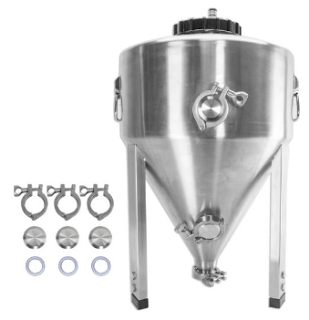We recently noticed a new product added to Keg King's website for their Apollo Titan 30L stainless steel pressure capable fermenter - pictured below. It certainly caught our attention so we thought we'd take a closer look and break down our thoughts and findings.
 |
| Keg King's Apollo Titan 30L Stainless Conical Fermenter Image Copyright of Keg King |
Pressure fermenting is all the rage these days in the homebrewing community - and rightfully so. It offers loads of benefits over fermenting at regular atmospheric pressure, so it's only natural that companies and manufacturers start focusing their products on meeting the demands of what brewers want - and at the moment it's pressure capable fermenters.
Plenty of brewers are no doubt looking for a more affordable next step up, after typically starting their homebrewing journey on some kind of plastic based fermeter. This next step open involves upgrading their equipment to stainless steel, but the price often makes it prohibitive to do so. This is obviously a problem Keg King identified and have created an attractive solution for.
Enter the Apollo Titan - a 30L stainless steel fermenter capable of withstanding pressures up to 35psi. At the moment, most home brewers opt for pressure fermenters made of PET plastic due to their attractive price point making them easily accessible - like Keg King's Fermenter King and Apollo range, and although these fermenters are great and certainly have their benefits, they do have some limitations.
So what have we got in the Apollo Titan? Let's break it down and take a look.
Firstly, the body is made entirely of stainless steel. Three steel legs support the fermenter, with leg extensions available to raise the height from 574mm to 754mm (measuring to the top of the ball lock posts on the lid). Total width is quoted at 367mm.
The body itself has the conical shape at the bottom allowing the trub and yeast cake to collect, allowing more of the fresh beer to be settled and accessed from on top using a floating dip tube.
There are 3 x 1.5" openings with tri clover clamps. One at the very bottom of the cone could have a dump valve fitted to allow the trub/yeast cake to be easily removed.
The next opening located part way up the cone could allow a sight glass, sampling tap, carbonation stone or other ball valve attachment to be fitted, for racking or drawing samples.
The upper most 1.5" opening could be used for a thermowell or temperature probe, though this may not even be necessary because of the clever lid design.
And this is the beauty of tri clover openings/attachments - they're a standard fitting, meaning you can fit just about any attachment you like that matches the 1.5" size, giving brewers enormous flexibility and customisation options to have their fermenter configured just the way they like. You can even opt to fit nothing to it and just attach the end caps that are included with the fermenter to blank off the ports.
Looking at the aforementioned lid and it appears that the same 115mm lid that is fitted to the PET-based Fermenter King and Apollo has been kept and reused for the Apollo Titan. The lid features two ball lock disconnects (1 for gas, 1 for liquid), a centralised port for a thermowell, plus a screw in pressure release valve (PRV) which doubles as a dry hopping port.
 |
| Apollo Titan Lid Image Copyright of Keg King |
No doubt it's this clever lid design that gives the Apollo Titan the ability to withstand such high pressures as 35psi. Most other stainless fermenters feature a much larger lid - usually the entire diameter of the top of the fermenter body meaning they are limited to how much pressure they can withstand. A smaller lid/opening also means it's easier to seal and less likely to leak which is often a source of frustration for brewers with pressure fermenting.
Having a body made entirely of stainless steel means you essentially have a 30L keg. PET plastics inevitably leech some oxygen over extended periods of time, but there's no such risk with stainless steel meaning you can ferment and store your beer in the same vessel indefinitely if you wanted to. Stainless is also much more durable when it comes to cleaning and the types of cleaning agents that can be used on them.
Keg King state that the body is actually the same size as the Apollo fermenter meaning some of the accessories like the insulating jacket and cooling coils are interchangeable between the models.
Currently on the Keg King website at AU$399, the price point is seriously sharp and attractive, with an anticipated release date of mid to late July 2022. The inclusion of tri clover ports means that brewers can upgrade and add parts later on if they wish to, and the use of stainless steel means their investment will last a very long time if looked after.
What do you think about the new Apollo Titan? Will you be upgrading? Let us know in the comments below.
Now that this has been released and is available for sale, you can check out our full Hands on Review of the Apollo Titan fermenter.

No comments:
Post a Comment